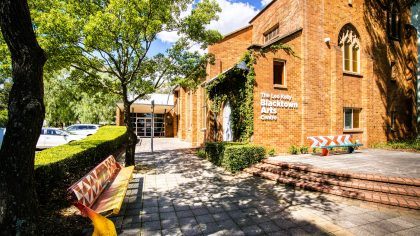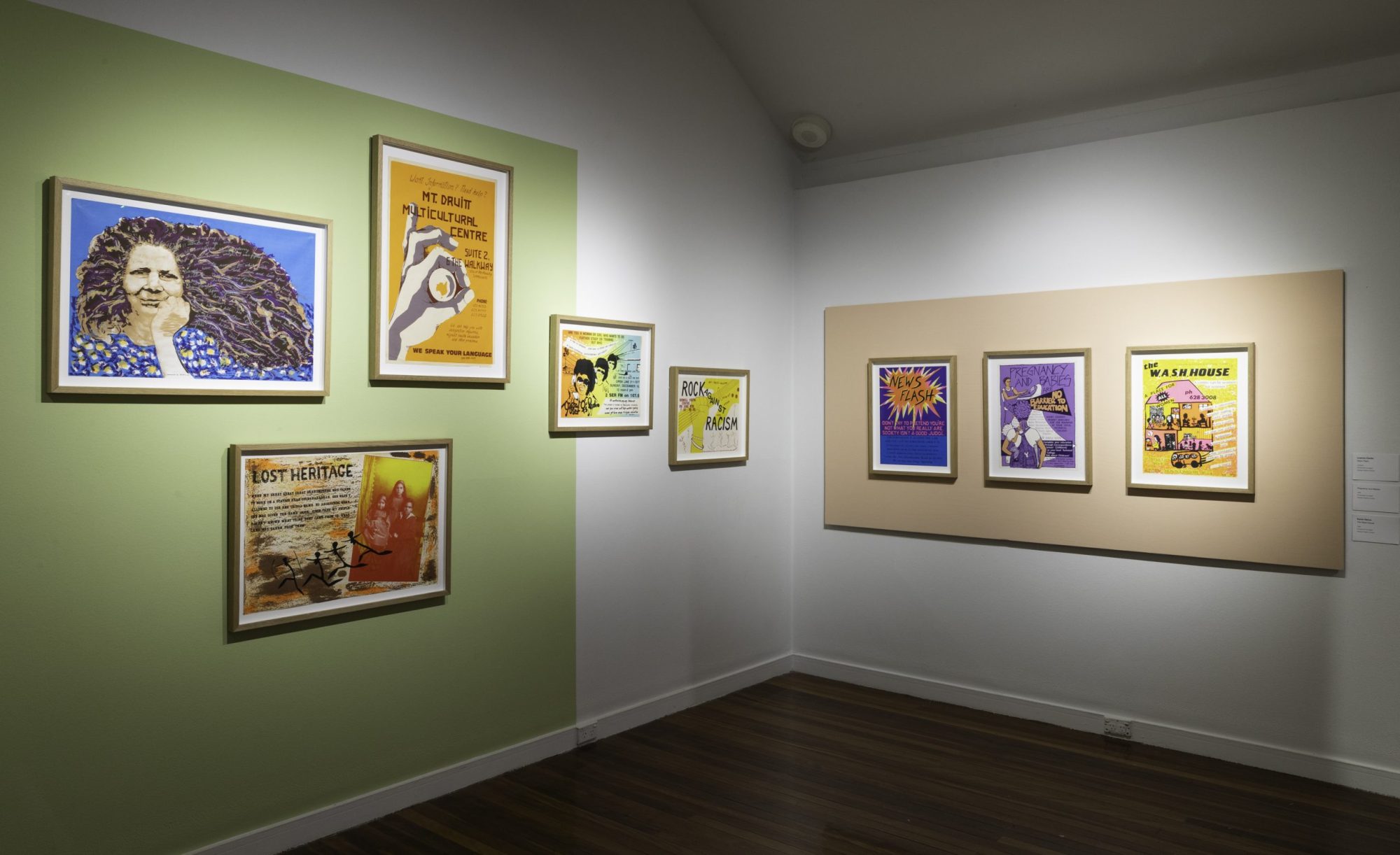
The Leo Kelly Blacktown Arts Centre
The Leo Kelly Blacktown Arts Centre is closed.

A Real Experience exhibition runs from 1 July to 13 September, focusing on female-led artworks, not only from the Blacktown City Art Collection, but also the Garage Graphix archive.
A selection of works from the archive are on display created by a range of local artists, providing an insight into the advocacy and activism deeply rooted in the collective’s practice. These works champion women’s stories from First Nations perspectives, explore the lived experiences of migrants, and highlight local women’s services and events in Western Sydney throughout the 1980s and 1990s.
What is ‘Garage Graphix?’
Garage Graphix was an outstanding example of community arts practice and leadership in Australia. ‘The Garage’ produced hundreds of political and socially relevant screen-printed posters with, for, and by the western Sydney community. It led the field in the development of community-based art workshops, community activism, and the telling of western Sydney stories and concerns.
Central to its operation was the Aboriginal arts team, developing Aboriginal arts and mentorships. Led by Aboriginal arts workers, this pioneering program was one of the first of its kind in Australia. The artworks produced through this program are key examples of the development of suburban Aboriginal art. As a result, Garage Graphix occupies a unique place within the broader history of political poster making in Australia.
After the Garage closed its doors in 1998, an archive of objects, records and approximately 400 poster artworks, were placed in storage under the passive management of Blacktown City Council. With the assistance of Community Heritage Grants, funded by the Australian Government through the National Library of Australia, a process is underway to preserve the archive and open public access to this nationally important collection.
More about the current exhibited works:

Lost Heritage, Alice Hinton Bateup, 1986, © the artist
Garage Graphix led Australia in the decolonisation of cultural institutions. The Aboriginal Art Program’s poster outputs and the support and service it offered to the Aboriginal community through Aboriginal organisations were unique of their time and without parallel today.
In particular, the poster work of Alice Hinton- Bateup, supported by her sister and Aboriginal Arts Program coordinator, Maxine Conaty, proved ground-breaking. Posters produced through the Aboriginal Art Program are enormously significant because unlike many of the other poster collectives or poster workshops the voice and perspective is Aboriginal. At the time of production this was unusual.
This work toured internationally as part of the exhibition Aratjara: Art of the First Australians, which travelled during 1993-94 to Dusseldorf (Germany), London (UK), and Humlebaek (Denmark).

Ruth’s Story, Alice Hinton-Bateup, 1988, © the artist
This print is the personalised story of Ruth Witbourne, about her removal as a young child taken from her mother and family.
This poster is one Aboriginal woman’s story. It resulted from a Koori parents’ seminar held in 1988 at Pittuma, a local Western Sydney Aboriginal Cultural Centre. It was a powerful gathering, as Aboriginal parents shared the ongoing intergenerational trauma caused by the experiences of the Stolen Generations. Alice Hinton-Bateup worked with Ruth Whitbourne to create a print telling her story, in her own words. The honesty and vulnerability in the text testifies to Garage Graphix being a space where difficult conversations could occur.
This work toured internationally as part of the exhibition Aratjara: Art of the First Australians, which travelled during 1993-94 to to Dusseldorf (Germany), London (UK), and Humlebaek (Denmark).

Childcare, a political issue, Zoe Manners, 1983, © the artist
Text reads:
“Childcare, a political issue?”
“It sure is!”
“I’ll say!”
“Too right it is!”
“You can say that again!”
“I always suspected the personal is political!”
Garage Graphix embraced the feminist stance ‘the personal is political’. With bravery, openness, and a strong sense of humour, prints tackled challenging issues such as childcare, parenting, domestic violence, housing and health. The work with Western Sydney women was particularly important, as at the time the Mt Druitt area was home to a large population of families and many solo mothers.

The Wash House, Karen Vance, 1989, © the artist
Garage Graphix posters were displayed in locations such as women’s centres, refuges, rape crisis centres, health clinics, schools, courthouses and shopping centres. From these walls they would speak candidly about the cause of an issue, and would give practical information for services that empowered Western Sydney women

Rock Against Racism, artwork by Alice Hinton-Bateup, not dated, © the artist



Together in this Place – We Wish All These Dreams Would Come True, Jenny Pitty, Penny Richardson, 1990, © the artist
This series of posters from the Villawood Multicultural Women’s Community Arts Project are a powerful example of community building through poster making. A group of migrant women were given disposable cameras to photograph their lives and homes. They then cut up and collaged these photographs, integrating them with first-person texts. The women speak plainly of difficulties they face in poorly resourced urban environments: “Some things are much better than we expected, and some things are much worse”. Prior to the poster project many women had not spoken to each other, fearing the language barrier was too great. Making the posters connected them, and empowered them to speak collectively.

Pregnancy and Babies, unknown artist, 1988, © the artist
Text reads:
Pregnancy and babies are no barrier to education.
Short courses are readily available for job training at your local technical college.
Welding, needlecraft, retail certificate, computer courses, maths workshops, motor maintenance, reading skills, travel agency practice, and many more.
Complete your education through Correspondence School (3398444) or your local Technical College.
Ask about Childcare!

News Flash, Leanne Clerke, not dated, © the artist
Text reads:
Don’t try to pretend you’re not what you really are, society isn’t a good judge.
Discrimination is against the law and you can do something about it.
If you suspect you can’t get a job, a house, a promotion, proper health care or any service because you’re a woman, Aboriginal, lesbian, migrant or homosexual
Contact the Anti-Discrimination Board on 231-0922.
We stop these things happening.

Crystal Set Women’s Radio, unknown artist, not dated, © the artist
Text reads:
Are you a woman or girl who wants to do further study or training but who
– Has no transport, child care or simply can’t afford it?
– Lacks confidence, encouragement and support?
If this sounds like you, give us a call on our open line 211-1977
Sunday, December 16, 12 noon – 2pm, 2 SER FM on 107.5
It’s worthwhile ringing because this project is funded by Macquarie University and your views will help Western Sydney women get fairer access to higher education.

Mt Druitt Multicultural Centre, unknown artist, not dated, © the artist
Text reads:
Want information? Need help?
Mt. Druitt Multicultural Centre – Suite 2, 6 the Walkway (above the Housing Commission). Phone: 625 4633, 625 4777, 625 0522.
We can help you with immigration enquiries, migrant health education and other problems.
We speak your language.